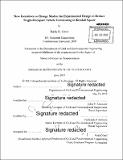| dc.contributor.advisor | John P. Attanucci and Frederick P. Salvucci. | en_US |
| dc.contributor.author | Gates, Emily K | en_US |
| dc.contributor.other | Massachusetts Institute of Technology. Department of Civil and Environmental Engineering. | en_US |
| dc.coverage.spatial | n-us-ma | en_US |
| dc.date.accessioned | 2015-10-30T18:57:57Z | |
| dc.date.available | 2015-10-30T18:57:57Z | |
| dc.date.copyright | 2015 | en_US |
| dc.date.issued | 2015 | en_US |
| dc.identifier.uri | http://hdl.handle.net/1721.1/99585 | |
| dc.description | Thesis: S.M. in Transportation, Massachusetts Institute of Technology, Department of Civil and Environmental Engineering, 2015. | en_US |
| dc.description | Cataloged from PDF version of thesis. | en_US |
| dc.description | Includes bibliographical references (pages 153-159). | en_US |
| dc.description.abstract | This thesis examines and suggests modifications to the design of employer commuter benefit programs to reduce single-occupancy vehicle commuting in areas served by transit with a focus on Kendall Square and MIT in Cambridge, Massachusetts. Sustainable transportation incentive programs for employers can be mutually beneficial for employees, employers, transit agencies, and cities if the options are offered in a manner that is simple to implement and maintain, flexible for employees, and cost little relative to the benefits provided to the employer. Employers are motivated to offer competitive benefits to attract employees while keeping their parking and overhead costs low. Cities wish to reduce road congestion and promote a business-friendly atmosphere in order to increase economic growth. Transit agencies (like the MBTA) want to increase revenue and expand ridership. Employees wish to spend less time and/or money commuting to work. This research provides a baseline analysis of current commuting behavior for large employers in Cambridge, MA as well as an analysis of current Transportation Demand Management (TDM) techniques used nationwide and in Cambridge to provide incentives to promote behavior change. After examining the results of the previous employee MIT/MBTA Mobility Pass Pilot experiment, several implementation scenarios are proposed for an expanded experiment at MIT. The thesis provides the design for a tool to track the impacts of commuter benefit changes at the individual and employer level, as well as present a series of potential commuter benefits and their expected effects on mode share for large employers in an urban environment. Using financial and social "nudges" to promote behavior change, the recommended incentives include an expanded universal transit pass, parking cash-out, daily parking charges, Walk or Bike to Work events, cash prize lotteries and a commuter dashboard with gamification elements to show employees their commuting behavior over time and keep them interested in alternative commutes over the long-run. By making transit, walking and bicycling the zero marginal cost choice while charging for parking and offering prizes for more sustainable commuting, employers, cities and individuals can reduce the demand for already limited parking spaces in an urban environment, live more sustainably, and reduce the need to build new parking infrastructure in the future. Federal law allows commuter benefits, including transit and bicycling, to be treated as 'pre-tax,' which provides significant financial incentive to support these initiatives. | en_US |
| dc.description.statementofresponsibility | by Emily K. Gates. | en_US |
| dc.format.extent | 159 pages | en_US |
| dc.language.iso | eng | en_US |
| dc.publisher | Massachusetts Institute of Technology | en_US |
| dc.rights | M.I.T. theses are protected by copyright. They may be viewed from this source for any purpose, but reproduction or distribution in any format is prohibited without written permission. See provided URL for inquiries about permission. | en_US |
| dc.rights.uri | http://dspace.mit.edu/handle/1721.1/7582 | en_US |
| dc.subject | Civil and Environmental Engineering. | en_US |
| dc.title | New incentives to change modes : an experimental design to reduce single-occupant vehicle commuting in Kendall Square | en_US |
| dc.title.alternative | Experimental design to reduce single-occupant vehicle commuting in Kendall Square | en_US |
| dc.type | Thesis | en_US |
| dc.description.degree | S.M. in Transportation | en_US |
| dc.contributor.department | Massachusetts Institute of Technology. Department of Civil and Environmental Engineering | |
| dc.identifier.oclc | 925473938 | en_US |
